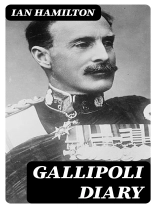In ‘Gallipoli Diary, ‘ Ian Hamilton presents a poignant chronicle of the ill-fated Gallipoli Campaign during World War I, delivering a unique perspective on this historical event through thoughtful prose and vivid imagery. The diary format allows for an intimate portrayal of the experiences, sentiments, and struggles faced by soldiers, skillfully interweaving personal anecdotes with broader military and political commentary. Hamilton’s literary style is both reflective and critical, capturing the chaos of battle while also exploring themes of bravery, loss, and the tragic consequences of war, all within the context of early 20th-century imperial ambitions. Ian Hamilton, a British general who oversaw the campaign, offers readers not just a soldier’s memories but an insider’s analysis of strategic failures and leadership dilemmas. His firsthand experiences and deep understanding of military operations add authenticity to the narrative, allowing readers to grasp the complexities that influenced the outcome of this significant, yet often overlooked, chapter of the war. ‘Gallipoli Diary’ is essential reading for anyone interested in military history, World War I, or the human experience of warfare. Hamilton’s insights and eloquence make this diary not only a historical document but also a timeless reflection on courage and human endurance amid the turmoil of combat.
Tentang Penulis
Ian Hamilton was a distinguished British general and writer, renowned for his military career as well as his literary contributions. Born on January 16, 1853, in Corfu, he forged a reputable legacy over decades of service in the British Army, eventually rising to the rank of General. He played prominent roles in various British colonial conflicts at the turn of the 20th century, including the Second Boer War and the First World War. Hamilton’s literary acclaim is largely tied to his ‘Gallipoli Diary, ‘ an introspective work that provides a profound window into the experiences of a senior commander during one of the most controversial campaigns of the First World War. His account offers a blend of strategic analysis, personal reflection, and poignant observations, etching a human face to the tragedy and futility of war. Hamilton’s narrative style, marked by its frank and detailed recount of the Gallipoli Campaign’s challenges, is both a historical resource and a testament to his reflective character. His writing has been a subject of study for both military historians and literature scholars, who examine his contribution to the understanding of military leadership and the psychological toll of warfare. Ian Hamilton passed away on October 12, 1947, but his works continue to be referenced for their historical value and literary merit.












